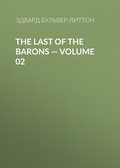
Эдвард Бульвер-Литтон
"My Novel" — Complete
CHAPTER XVIII
And such a woman!
She had on a cotton gown,—very neat, I dare say, for an under-housemaid; and such thick shoes! She had on a little black straw bonnet; and a kerchief, that might have cost tenpence, pinned across her waist instead of a shawl; and she looked altogether-respectable, no doubt, but exceedingly dusty! And she was hanging upon Leonard’s neck, and scolding, and caressing, and crying very loud. “God bless my soul!” said Mr. Richard Avenel.
And as he uttered that innocent self-benediction, the woman hastily turned round, and darting from Leonard, threw herself right upon Richard Avenel—burying under her embrace blue-coat, moss rose, white waistcoat and all—with a vehement sob and a loud exclamation!
“Oh! brother Dick!—dear, dear brother Dick! And I lives to see thee agin!” And then came two such kisses—you might have heard them a mile off! The situation of brother Dick was appalling; and the crowd, that had before only tittered politely, could not now resist the effect of this sudden embrace. There was a general explosion! It was a roar! That roar would have killed a weak man; but it sounded to the strong heart of Richard Avenel like the defiance of a foe, and it plucked forth in an instant from all conventional let and barrier the native spirit of the Anglo-Saxon.
He lifted abruptly his handsome masculine head, and looked round the ring of his ill-bred visitors with a haughty stare of rebuke and surprise.
“Ladies and gentlemen,” then said he, very coolly, “I don’t see what there is to laugh at! A brother and sister meet after many years’ separation, and the sister cries, poor thing. For my part I think it very natural that she should cry; but not that you should laugh!”
In an instant the whole shame was removed from Richard Avenel, and rested in full weight upon the bystanders. It is impossible to say how foolish and sheepish they all looked, nor how slinkingly each tried to creep off.
Richard Avenel seized his advantage with the promptitude of a man who had got on in America, and was, therefore, accustomed to make the best of things. He drew Mrs. Fairfield’s arm in his, and led her into the house; but when he had got her safe into his parlour—Leonard following all the time—and the door was closed upon those three, then Richard Avenel’s ire burst forth.
“You impudent, ungrateful, audacious—drab!”
Yes, drab was the word. I am shocked to say it, but the duties of a historian are stern: and the word was drab.
“Drab!” faltered poor Jane Fairfield; and she clutched hold of Leonard to save herself from falling.
“Sir!” cried Leonard, fiercely.
You might as well have cried “sir” to a mountain torrent. Richard hurried on, for he was furious.
“You nasty, dirty, dusty dowdy! How dare you come here to disgrace me in my own house and premises, after my sending you L50! To take the very time, too, when—when Richard gasped for breath; and the laugh of his guests rang in his ears, and got into his chest, and choked him. Jane Fairfield drew herself up, and her tears were dried.
“I did not come to disgrace you! I came to see my boy, and—”
“Ha!” interrupted Richard, “to see him.”
He turned to Leonard: “You have written to this woman, then?”
“No, sir, I have not.”
“I believe you lie.”
“He does not lie; and he is as good as yourself, and better, Richard Avenel,” exclaimed Mrs. Fairfield; “and I won’t stand here and hear him insulted,—that’s what I won’t. And as for your L50, there are forty-five of it; and I’ll work my fingers to the bone till I pay back the other five. And don’t be afeard I shall disgrace you, for I’ll never look on your face agin; and you’re a wicked, bad man,—that’s what you are!”
The poor woman’s voice was so raised and so shrill, that any other and more remorseful feeling which Richard might have conceived was drowned in his apprehensions that she would be overheard by his servants or his guests,—a masculine apprehension, with which females rarely sympathize; which, on the contrary, they are inclined to consider a mean and cowardly terror on the part of their male oppressors.
“Hush! hold your infernal squall,—do’.” said Mr. Avenel, in a tone that he meant to be soothing. “There—sit down—and don’t stir till I come back again, and can talk to you calmly. Leonard, follow me, and help to explain things to our guests.”
Leonard stood still, but shook his head slightly.
“What do you mean, sir?” said Richard Avenel, in a very portentous growl. “Shaking your head at me? Do you intend to disobey me? You had better take care!”
Leonard’s front rose; he drew one arm round his mother, and thus he spoke,
“Sir, you have been kind to me, and generous, and that thought alone silenced my indignation when I heard you address such language to my mother; for I felt that, if I spoke, I should say too much. Now I speak, and it is to say, shortly, that—”
“Hush, boy,” said poor Mrs. Fairfield, frightened; “don’t mind me. I did not come to make mischief, and ruin your prospex. I’ll go!”
“Will you ask her pardon, Mr. Avenel?” said Leonard, firmly; and he advanced towards his uncle.
Richard, naturally hot and intolerant of contradiction, was then excited, not only by the angry emotions, which, it must be owned, a man so mortified, and in the very flush of triumph, might well experience, but by much more wine than he was in the habit of drinking; and when Leonard approached him, he misinterpreted the movement into one of menace and aggression. He lifted his arm: “Come a step nearer,” said he, between his teeth, “and I’ll knock you down.” Leonard advanced the forbidden step; but as Richard caught his eye, there was something in that eye—not defying, not threatening, but bold and dauntless—which Richard recognized and respected, for that something spoke the Freeman. The uncle’s arm mechanically fell to his side. “You cannot strike me, Mr. Avenel,” said Leonard, “for you are aware that I could not strike again my mother’s brother. As her son, I once more say to you,—ask her pardon.”
“Ten thousand devils! Are you mad?—or do you want to drive me mad? You insolent beggar, fed and clothed by my charity! Ask her pardon!—what for? That she has made me the object of jeer and ridicule with that d—-d cotton gown and those double-d—-d thick shoes—I vow and protest they’ve got nails in them! Hark ye, sir, I’ve been insulted by her, but I’m not to be bullied by you. Come with me instantly, or I discard you; not a shilling of mine shall you have as long as I live. Take your choice: be a peasant, a labourer, or—”
“A base renegade to natural affection, a degraded beggar indeed!” cried Leonard, his breast heaving, and his cheeks in a glow. “Mother, Mother, come away. Never fear,—I have strength and youth, and we will work together as before.”
But poor Mrs. Fairfield, overcome by her excitement, had sunk down into Richard’s own handsome morocco leather easy-chair, and could neither speak nor stir.
“Confound you both!” muttered Richard. “You can’t be seen creeping out of my house now. Keep her here, you young viper, you; keep her till I come back; and then, if you choose to go, go and be—”
Not finishing his sentence, Mr. Avenel hurried out of the room, and locked the door, putting the key into his pocket. He paused for a moment in the hall, in order to collect his thoughts, drew three or four deep breaths, gave himself a great shake, and, resolved to be faithful to his principle of doing one thing at a time, shook off in that shake all disturbing recollection of his mutinous captives. Stern as Achilles when he appeared to the Trojans, Richard Avenel stalked back to his lawn.
CHAPTER XIX
Brief as had been his absence, the host could see that, in the interval, a great and notable change had come over the spirit of his company. Some of those who lived in the town were evidently preparing to return home on foot; those who lived at a distance, and whose carriages (having been sent away, and ordered to return at a fixed hour) had not yet arrived, were gathered together in small knots and groups; all looked sullen and displeased, and all instinctively turned from their host as he passed them by. They felt they had been lectured, and they were more put out than Richard himself. They did not know if they might not be lectured again. This vulgar man, of what might he not be capable? Richard’s shrewd sense comprehended in an instant all the difficulties of his position; but he walked on deliberately and directly towards Mrs. M’Catchley, who was standing near the grand marquee with the Pompleys and the dean’s lady. As those personages saw him make thus boldly towards them, there was a flutter. “Hang the fellow!” said the colonel, intrenching himself in his stock, “he is coming here. Low and shocking—what shall we do? Let us stroll on.” But Richard threw himself in the way of the retreat. “Mrs. M’Catchley,” said he, very gravely, and offering her his arm, “allow me three words with you.”
The poor widow looked very much discomposed. Mrs. Pompley pulled her by the sleeve. Richard still stood gazing into her face, with his arm extended. She hesitated a minute, and then took the arm.
“Monstrous impudent!” cried the colonel.
“Let Mrs. M’Catchley alone, my dear,” responded Mrs. Pompley; “she will know how to give him a lesson.”
“Madam,” said Richard, as soon as he and his companion were out of hearing, “I rely on you to do me a favour.”
“On me?”
“On you, and you alone. You have influence with all those people, and a word from you will effect what I desire. Mrs. M’Catchley,” added Richard, with a solemnity that was actually imposing, “I flatter myself that you have some friendship for me, which is more than I can say of any other soul in these grounds; will you do me this favour, ay or no?”
“What is it, Mr. Avenel?” asked Mrs. M’Catchley, much disturbed, and somewhat softened,—for she was by no means a woman without feeling; indeed, she considered herself nervous.
“Get all your friends—all the company, in short-to come back into the tent for refreshments, for anything. I want to say a few words to them.”
“Bless me! Mr. Avenel—a few words!” cried the widow, “but that’s just what they’re all afraid of. You must pardon me, but you really can’t ask people to a dejeune dansant, and then—scold ‘em!”
“I’m not going to scold them,” said Air. Avenel, very seriously,—“upon my honour, I’m not. I’m going to make all right, and I even hope afterwards that the dancing may go on—and that you will honour me again with your hand. I leave you to your task; and believe me, I’m not an ungrateful man.” He spoke, and bowed—not without some dignity—and vanished within the breakfast division of the marquee. There he busied himself in re-collecting the waiters, and directing them to re-arrange the mangled remains of the table as they best could. Mrs. M’Catchley, whose curiosity and interest were aroused, executed her commission with all the ability and tact of a woman of the world, and in less than a quarter of an hour the marquee was filled, the corks flew, the champagne bounced and sparkled, people drank in silence, munched fruits and cakes, kept up their courage with the conscious sense of numbers, and felt a great desire to know what was coming. Mr. Avenel, at the head of the table, suddenly rose.
“Ladies and Gentlemen,” said he, “I have taken the liberty to invite you once more into this tent, in order to ask you to sympathize with me upon an occasion which took us all a little by surprise to-day.
“Of course, you all know I am a new man,—the maker of my own fortunes.”
A great many heads bowed involuntarily. The words were said manfully, and there was a general feeling of respect. “Probably, too,” resumed Mr. Avenel, “you may know that I am the son of very honest tradespeople. I say honest, and they are not ashamed of me; I say tradespeople, and I’m not ashamed of them. My sister married and settled at a distance. I took her son to educate and bring up. But I did not tell her where he was, nor even that I had returned from America; I wished to choose my own time for that, when I could give her the surprise, not only of a rich brother, but of a son whom I intended to make a gentleman, so far as manners and education can make one. Well, the poor dear woman has found me out sooner than I expected, and turned the tables on me by giving me a surprise of her own invention. Pray, forgive the confusion this little family-scene has created; and though I own it was very laughable at the moment, and I was wrong to say otherwise, yet I am sure I don’t judge ill of your good hearts, when I ask you to think what brother and sister must feel who parted from each other when they were boy and girl. To me” (and Richard gave a great gulp, for he felt that a great gulp alone could swallow the abominable lie he was about to utter)—“to me this has been a very happy occasion! I’m a plain man: no one can take ill what I’ve said. And wishing that you may be all as happy in your family as I am in mine—humble though it be—I beg to drink your very good healths!”
There was a universal applause when Richard sat down; and so well in his plain way had he looked the thing, and done the thing, that at least half of those present—who till then had certainly disliked and half despised him—suddenly felt that they were proud of his acquaintance. For however aristocratic this country of ours may be, and however especially aristocratic be the genteeler classes in provincial towns and coteries, there is nothing which English folks, from the highest to the lowest, in their hearts so respect as a man who has risen from nothing, and owns it frankly. Sir Compton Delaval, an old baronet, with a pedigree as long as a Welshman’s, who had been reluctantly decoyed to the feast by his three unmarried daughters—not one of whom, however, had hitherto condescended even to bow to the host—now rose. It was his right,—he was the first person there in rank and station.
“Ladies and Gentlemen,” quoth Sir Compton Delaval, “I am sure that I express the feelings of all present when I say that we have heard with great delight and admiration the words addressed to us by our excellent host. [Applause.] And if any of us, in what—Mr. Avenel describes justly as the surprise of the moment, were betrayed into an unseemly merriment at—at—[the dean’s lady whispered ‘some of the’]—some of the—some of the—” repeated Sir Compton, puzzled, and coming to a deadlock [“holiest sentiments,” whispered the dean’s lady]—“ay, some of the holiest sentiments in our nature, I beg him to accept our sincerest apologies. I can only say, for my part, that I am proud to rank Mr. Avenel amongst the gentlemen of the county” (here Sir Compton gave a sounding thump on the table), “and to thank him for one of the most brilliant entertainments it has ever been my lot to witness. If he won his fortune honestly, he knows how to spend it nobly.”
Whiz went a fresh bottle of champagne.
“I am not accustomed to public speaking, but I could not repress my sentiments. And I’ve now only to propose to you the health of our host. Richard Avenel, Esquire; and to couple with that the health of his—very interesting sister, and long life to them both.”
The sentence was half drowned in enthusiastic plaudits, and in three cheers for Richard Avenel, Esquire, and his very interesting sister.
“I’m a cursed humbug,” thought Richard Avenel, as he wiped his forehead; “but the world is such a humbug!” Then he glanced towards Mrs. M’Catehley and, to his great satisfaction, saw Mrs. M’Catchley with her handkerchief before her eyes.
Truth must be told; although the fair widow might certainly have contemplated the probability of accepting Mr. Avenel as a husband, she had never before felt the least bit in love with him; and now she did. There is something in courage and candour—in a word, in manliness—that all women, the most worldly, do admire in men; and Richard Avenel, humbug though his conscience said he was, seemed to Mrs. M’Catchley like a hero.
The host saw his triumph. “Now for another dance!” said he, gayly; and he was about to offer his hand to Mrs. M’Catchley, when Sir Compton Delaval seizing it, and giving it a hearty shake, cried, “You have not yet danced with my eldest daughter; so if you’ll not ask her, why, I must offer her to you as your partner. Here, Sarah.”
Miss Sarah Delaval, who was five feet eight, and as stately as she was tall, bowed her head graciously; and Mr. Avenel, before he knew where he was, found her leaning on his arm. But as he passed into the next division of the tent, he had to run the gauntlet of all the gentlemen, who thronged round to shake hands with him. Their warm English hearts could not be satisfied till they had so repaired the sin of their previous haughtiness and mockery. Richard Avenel might then have safely introduced his sister—gown, kerchief, thick shoes, and all—to the crowd; but he had no such thought. He thanked Heaven devoutly that she was safely under lock and key.
It was not till the third dance that he could secure Mrs. M’Catchley’s hand, and then it was twilight. The carriages were at the door, but no one yet thought of going. People were really enjoying themselves. Mr. Avenel had had time, in the interim, to mature all his plans for completing and consummating that triumph which his tact and pluck had drawn from his momentary disgrace. Excited as he was with wine, and suppressed passion, he had yet the sense to feel that, when all the halo that now surrounded him had evaporated, and Mrs. M’Catchley was redelivered up to the Pompleys, whom he felt to be the last persons his interest could desire for her advisers, the thought of his low relations would return with calm reflection. Now was the time. The iron was hot, now was the time to strike it, and forge the enduring chain. As he led Mrs. M’Catchley after the dance, into the lawn, he therefore said tenderly,—
“How shall I thank you for the favour you have done me?”
“Oh!” said Mrs. M’Catchley, warmly, “It was no favour, and I am so glad—” She stopped.
“You’re not ashamed of me, then, in spite of what has happened?”
“Ashamed of you! Why, I should be so proud of you, if I were—”
“Finish the sentence and say—‘your wife!’—there, it is out. My dear madam, I am rich, as you know; I love you very heartily. With your help, I think I can make a figure in a larger world than this: and that, whatever my father, my grandson at least will be—but it is time enough to speak of him. What say you?—you—turn away. I’ll not tease you,—it is not my way. I said before, ay or no; and your kindness so emboldens me that I say it again, ay or no?”
“But you take me so unawares—so—so—Lord! my dear Mr. Avenel; you are so hasty—I—I—” And the widow actually blushed, and was genuinely bashful.
“Those horrid Pompleys!” thought Richard, as he saw the colonel bustling up with Mrs. M’Catchley’s cloak on his arm. “I press for your answer,” continued the suitor, speaking very fast. “I shall leave this place to-morrow, if you will not give it.”
“Leave this place—leave me?”
“Then you will be mine?”
“Ah, Mr. Avenel!” said the widow, languidly, and leaving her hand in his, “who can resist you?”
Up came Colonel Pompley; Richard took the shawl: “No hurry for that now, Colonel,—Mrs. M’Catchley feels already at home here.”
Ten minutes afterwards, Richard Avenel so contrived that it was known by the whole company that their host was accepted by the Honourable Mrs. M’Catchley. And every one said, “He is a very clever man and a very good fellow,” except the Pompleys—and the Pompleys were frantic. Mr. Richard Avenel had forced his way into the aristocracy of the country; the husband of an Honourable, connected with peers!
“He will stand for our city—Vulgarian!” cried the colonel. “And his wife will walk out before me,” cried the colonel’s lady,—“nasty woman!” And she burst into tears.
The guests were gone; and Richard had now leisure to consider what course to pursue with regard to his sister and her son.
His victory over his guests had in much softened his heart towards his relations; but he still felt bitterly aggrieved at Mrs. Fairfield’s unseasonable intrusion, and his pride was greatly chafed by the boldness of Leonard. He had no idea of any man whom he had served, or meant to serve, having a will of his own, having a single thought in opposition to his pleasure. He began, too, to feel that words had passed between him and Leonard which could not be well forgotten by either, and would render their close connection less pleasant than heretofore. He, the great Richard Avenel, beg pardon of Mrs. Fairfield, the washerwoman! No; she and Leonard must beg his. “That must be the first step,” said Richard Avenel; “and I suppose they have come to their senses.” With that expectation, he unlocked the door of his parlour, and found himself in complete solitude. The moon, lately risen, shone full into the room, and lit up every corner. He stared round bewildered,—the birds had flown. “Did they go through the keyhole?” said Air. Avenel. “Ha! I see! the window is open!” The window reached to the ground. Mr. Avenel, in his excitement, had forgotten that easy mode of egress. “Well,” said he, throwing himself into his easy-chair, “I suppose I shall soon hear from them: they’ll be wanting my money fast enough, I fancy.” His eye caught sight of a letter, unsealed, lying on the table. He opened it, and saw bank-notes to the amount of L50,—the widow’s forty-five country notes, and a new note, Bank of England, that he had lately given to Leonard. With the money were these lines, written in Leonard’s bold, clear writing, though a word or two here and there showed that the hand had trembled,—
I thank you for all you have done to one whom you regarded as the object of charity. My mother and I forgive what has passed. I depart with her. You bade me make my choice, and I have made it.
LEONARD FAIRFIELD.
The paper dropped from Richard’s hand, and he remained mute and remorseful for a moment. He soon felt, however, that he had no help for it but working himself up into a rage. “Of all people in the world,” cried Richard, stamping his foot on the floor, “there are none so disagreeable, insolent, and ungrateful as poor relations. I wash my hands of them!”







